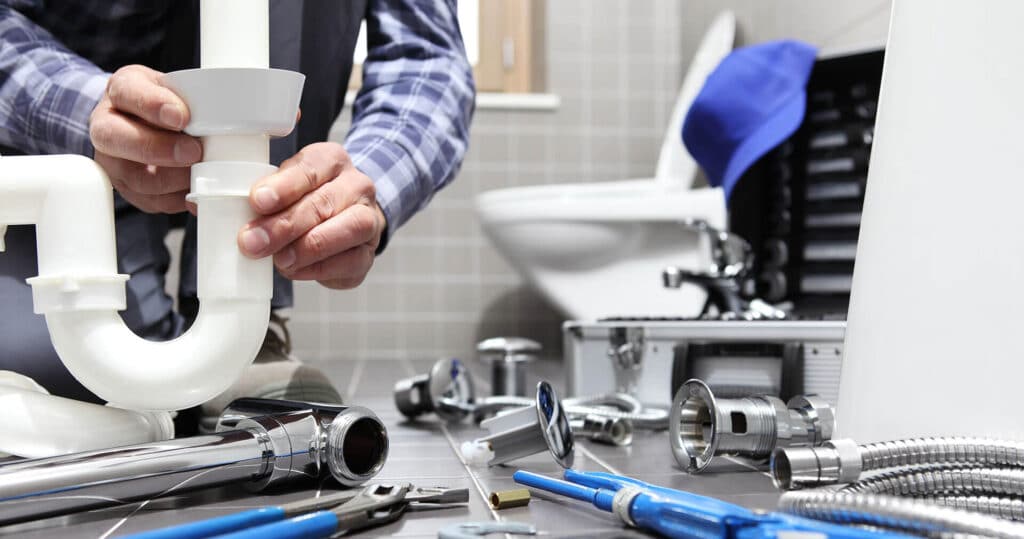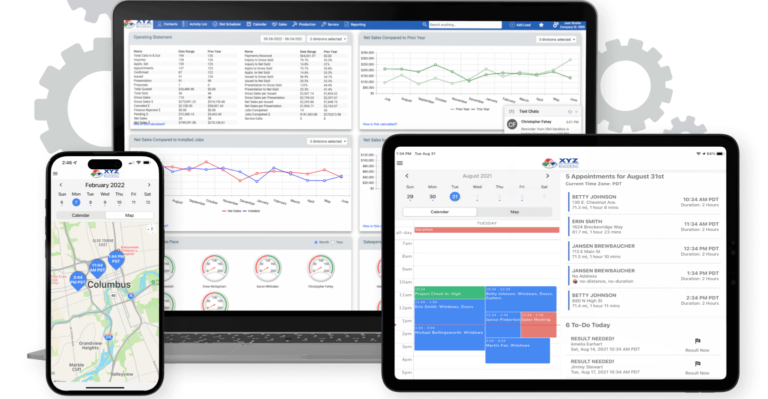What makes an effective plumbing ad? Certainly, it needs to be eye-catching, but is that the only consideration? Not remotely.
There are many elements that can help bump up your ad’s noticeability.
With the right approach, you can create compelling ads that speak directly to your audience’s needs. They can showcase your services as the perfect solution to their plumbing problems.
The benefits are clear: more visibility, more leads, and, ultimately, more business.
This article will guide you through the essentials of creating impactful plumbing ads.
We’ll dive into what makes an ad stand out. You’ll explore strategies to leverage these ads for growth and find practical tips to kickstart your advertising.
Let’s start by examining the elements of a successful plumbing ad.
The Anatomy of an Effective Plumbing Ad
What makes an effective plumbing ad? Let’s break down the basics:
A Clear Message
Your plumbing ad’s message is the bridge between your service and a potential customer’s needs.
Instead of just listing services, highlight the benefits. For example, instead of “We fix leaks,” try “Keep your home safe and dry with our leak repair services.”
Speak directly to the reader. Use “you” and “your” to make the message sound more personal. Say something like, “Protect your home from water damage.”
Good Photography
Visuals can instantly convey the quality and range of your services.
Use clear photos with good lighting, but avoid stock images. Authentic photos from your jobs feel more trustworthy and showcase your actual work.
A Strong Call to Action
A call to action (CTA) guides customers on their next steps. A well-crafted CTA increases your ad’s effectiveness.
Always be clear and direct. A CTA like “Call us today to stop leaks fast!” is direct and tells the customer exactly what to do and why.
Consider adding an offer to your CTA, like a free consultation or a discount on first-time services.
Try something like “Call now and get 10% off your first leak repair!”
RELATED ARTICLE: Plumbing Marketing Ideas: How to Get More Customers
A Personal Touch
Bring your ad to life with a personal element that sets you apart from competitors.
If you pride yourself on honesty, punctuality, or cleanliness, mention that. For example, “Your time is valuable. We always arrive on time and ready to solve your plumbing issues.”
If possible, include a short customer testimonial in your ad.
A quote from a satisfied customer can be very persuasive. For example, “Alex fixed our emergency leak in no time—truly a lifesaver!”
Reaching Your Target Audience
It’s important to ensure your ad speaks to the right people.
Think about common plumbing problems your target customers might have.
It’s not just a leaking tap. Maybe they’re worried about the cost of wasted water. Your ad could say, “Stop leaks and save money.”
Also, consider their lifestyle.
Some people might need a plumber but are too busy during the week. To appeal to emergency clientele, your ad could say, “Weekend plumbing services available.”
By focusing on these details, your plumbing ad will not only grab attention but also speak directly to the people who need your services the most.

How to Boost Customer Base with Effective Plumbing Ads
You’ve seen what makes a compelling ad. Now, let’s explore some tips and strategies to squeeze the maximum value out of your ad spend.
Tip 1: Choose the Right Ad Format and Platform
Different plumbing services might require different approaches to advertising.
Let’s look at some options:
Search Ads
When people look up plumbing help on Google, search ads pop up at the top. They have a headline, some brief information, and a link to your website.
Here are two important tips for using search ads:
- Select keywords: Choose words that people are likely to use when searching for a plumber. Phrases like leak repair or emergency plumber might help your ad appear on search engine results pages.
- Control spending: Start small. If the ads work well, you can spend more.
Also, keep in mind that for the home improvement industry, Google Ads deliver:
- Average click-through rate (CTR): 4.8%
- Average cost-per-click (CPC): $6.55
- Average conversion rate: 10.22%
- Average cost-per-lead: $66.02
Use these stats to decide whether search ads are right for you.
Social Media Ads
Ads on social media let you connect with your audience. They can highlight jobs well done or share positive customer stories.
First, choose your audience. You can filter by details, like where they live or what they like.
Then, decide whether a boosted post or sponsored ad works best:
- A boosted post is one that you pay for to show to more people.
- A sponsored ad is made through special tools and can be very detailed.
Local Services Ads
These ads appear right at the top when someone searches for a plumber in their area. For example, they might search “plumber in Milwaukee.”
The benefits? You only pay if someone contacts you because of the ad.
It’s a great choice for local businesses. It helps people in your area find you first.
Google Display Ads
These ads aren’t just text. They can be pictures or videos that show up while people are browsing the internet.
Google display ads use powerful targeting to increase your visibility.
Traditional Advertising
Think about who your customers are. Sometimes, ads in newspapers or on local radio stations work better.
RELATED ARTICLE: Plumbing Leads: 6 Effective Ways to Get More Plumbing Leads
Tip 2: Set a Realistic Budget
Deciding on a budget for your ads is critical. You need to spend enough to reach people, but not so much that it hurts your business.
First, think about your return on investment or ROI. It’s a way to see if the money you spend on ads is worth it. This can help you decide on a budget.
Here’s how to calculate it:
ROI = (money you make from ads – money you spent on ads) / money you spent on ads
Let’s say you spent $300 on ads. After running these ads, you made $900 in sales from customers who clicked on them.
Here’s how you’d calculate your ROI:
ROI: (900 – 300) / 300, ROI = 2
So, your ROI is two or, when expressed as a percentage, 200%. This means you made back twice the amount you spent on ads.
So, how do you set your budget? Here’s some guidance:
- Start small: Begin with a budget you’re comfortable with. You don’t have to spend a lot at first.
- Track your ads: Keep an eye on how well your ads are doing. Are they bringing in customers?
- Adjust as needed: If your ads are working well, you might decide to spend a bit more. If not, it’s okay to try something else.
RELATED ARTICLE: 3 Reasons to Maintain Marketing Spend in a Downturn (and Why)

Tip 3: Design Your Plumbing Ads
Deciding whether to create your ads yourself or hire a professional depends on your budget and values. You have two options:
- Doing it yourself: DIY can save money and might be fine for simple ads. But it might not look as slick as a professional’s work.
- Hiring a professional: A pro can make your ad look high quality and might have a creative approach to make the ad more effective. However, this option costs more.
Whichever option you choose, follow these best practices:
- Simplicity is key: Don’t overcrowd your ad. A clean, simple design is easier to understand.
- Be direct: Clearly state what you’re offering. Make sure your message is easy to grasp at a glance.
- Call to action: Always include clear instructions for what the viewer should do next, like “Call Today for a Free Quote.”
Tip 4: Test, Measure, and Adjust
Getting the most out of your plumbing ads involves a cycle of testing, measuring performance, and making necessary adjustments.
Metrics are your guide to understanding how your ads perform.
They answer these key questions: Are people noticing your ad? Are they following through by clicking or calling?
This information is vital because it tells you whether your ad is effective.
Which metrics should you monitor?
- Views: This tells you how many people are seeing your ad.
- Clicks: This number shows how many viewers are interested enough to click on your ad for more details.
- Conversions: These are actions people take after seeing your ad, like calling your business or sending an email inquiry.
A/B testing is a technique where you compare two ad versions to see which performs better.
Differences could involve changing the image, the ad copy, or even the call to action. It’s a powerful way to discover what resonates best with your audience.
Based on what you learn from your metrics and A/B testing, you’ll likely need to tweak your ads. You may adjust the wording, swap out images, or target different audiences.
It’s all about refining your approach based on real data to improve your ad’s performance and attract more customers.
RELATED ARTICLE: Leads by Phone: How to Generate High-Quality Phone Leads
How You Can Start Boosting Your Customer Base with Effective Plumbing Ads Right Now
Think you’re ready to put these advertising techniques into practice? Here are some steps you can take right now:
Develop Your Ideal Customer Profile.
Think about who needs your services the most. Is it homeowners, businesses, or both? What does that demographic look like? Use details like age, location, and lifestyle to create the profile.
Determine Your Advertising Budget.
Decide how much you can spend on ads each month. Remember, even a small budget can make a big difference if you spend it wisely.
Choose Your Advertising Platforms.
Choose where you want to place your ads. Do a little research into your target audience. Where do they spend their time? That may be where you want to start your plumbing ad campaign.
Craft Your First Ad.
Use what you’ve learned to create your ad. Keep your message clear, use a great picture or video, and tell customers exactly what to do next.
Set Up Tracking.
Set up tracking tools so you can see how your ad performs. Google Analytics is a good start. It’s free and shows you how many people see your ad and visit your website.
Plan to Review and Optimize.
Set a date to analyze your ad’s performance. Be ready to try new things if you’re not getting the desired results.



